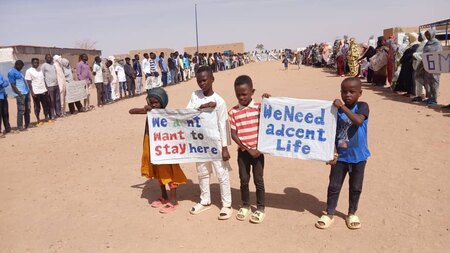Alarme Phone Sahara, together with Refugees in Libya, Refugees in Tunisia, Watch the Med - Alarmphone, ASGI and other international organisations, has launched an open letter to the UNHCR to adress the situation in UNHCR refugee camp in Agadez and amplify the voices of refugees inside the camp protesting against unbearable living conditions.

To the kind attention of
UNHCR Niger (ngrni@unhcr.org), Mr. Filippo Grandi - UNHCR High Commissioner, Mr. Volker Türk - United Nations High Commissioner for Human Rights, Mr. Gehad Madi - Special Rapporteur on the Human Rights of Migrants, Ms. Siobhàn Mullally - Special Rapporteur on Trafficking in persons, especially women and children, Ms. Mary Lawlor - Special Rapporteur on the situation of Human Rights Defenders, Ms. Alice Jill Edwards - Special Rapporteur on torture and other cruel, inhuman or degrading treatment or punishment
Dear UNHCR High Commissioner Mr. Filippo Grandi and Dear UNHCR Office in Niger,
Dear United Nations High Commissioner for Human Rights Mr. Volker Türk,
Dear Special Rapporteur on torture and other cruel, inhuman or degrading treatment or punishment Ms. Alice Jill Edwards,
Dear Special Rapporteur on the Human Rights of Migrants Mr. Gehad Madi,
Dear Special Rapporteur on Trafficking in persons, especially women and children Ms. Siobhàn Mullally,
Dear Special Rapporteur on the situation of Human Rights Defenders, Ms. Mary Lawlor,
With the present communication we aim to bring to your attention the critical situation in the humanitarian camp for asylum seekers and refugees, managed by UNHCR, located 15 km from Agadez in northern Niger, as well as the illegal deportation policies that are leading people into the camp.
As representatives of international civil society and local organizations working closely with asylum seekers and refugees, we have received numerous reports concerning the deplorable living conditions in the camp. We express our deep concern and urge you to take all necessary measures to address this situation.
The UNHCR refugee camp in Agadez: Refugee protests against degraded living conditions and lack of lasting and dignified solutions
For several years, UNHCR has been operating the humanitarian camp, primarily hosting individuals from Sudan and other war-torn countries, as well as others in need of protection.
The reports from camp residents regarding their living conditions are deeply alarming, highlighting severe shortages of food, inadequate medical care, and a lack of access to education for children. Pregnant women, the elderly, and children are particularly vulnerable to these harsh conditions. Beyond the immediate need for essential support, there are no long-term or sustainable prospects for the refugees residing in the camp. Some individuals have been living there for up to nine years, have not been granted asylum status, and remain unable to build an independent future for themselves.
From 2019, many protests were organized by camp residents:
From December 2019 until the beginning of January 2020, refugees from the Agadez camp assembled for a sit in protest outside the UNHCR office. This protest was ended by a police crack down and followed by facilities of the refugee camp set on fire. Several hundred refugees were arrested and 111 of them were sentenced in court, instead of providing solutions for the problems that had led to the protest.
Since autumn 2024, this has come to a head in a wave of protests that continues to this day, triggered by a serious deterioration in living conditions. The voice of the refugees is the self-organised groups “refugees in Niger” and “refugees in Tunisia”.
As declared by UNHCR itself, they have been denied food vouchers for weeks in response for participating in the protests. While for the refugees, this means punishment for participating in a legitimate protest against unbearable living conditions, the UNHCR stated on 27 February that it had suspended the food vouchers at the request of the Nigerien authorities.
Recently, 8 refugees were arrested as reprisal for the protests.
Chain deportation practices and lack of lasting and dignified solutions
Asylum seekers and refugees residing in the camp come mostly from war torn countries, especially in Eastern Africa. Initially, these were primarily individuals evacuated from Libya (through the Emergency Transit Mechanism) or who had fled the country due to intolerable conditions, hoping to be resettled to safer countries thanks to the UNHCR’s assistance.
In recent years, it has become increasingly clear that many asylum seekers are being trapped in the Agadez camp due to the pushback and deportation policies enforced by Niger’s neighboring states, which severely violate migrants’ rights.
For several years, tens of thousands of people have been illegally deported from Algeria to the border of Niger annually, with the highest number exceeding 30000 people in 2024. Besides Nigerien citizens who have allegedly been deported due to a readmission agreement between Algeria and Niger, many thousands of people from different African countries have also been deported in “non-official” deportation convoys. The latter are usually dropped off in the desert at the so-called "Point 0" about 15km outside the border village of Assamaka.
Since 2023, Tunisian authorities have carried out mass arrests followed by the deportation of migrants and refugees to the borders of Libya and Algeria. The Algerian security forces often deport these individuals further to the border with Niger. These policies of managing migration are deeply flawed, both legally and ethically, as they involve forced, illegal, and violent transfers and are often legitimized by weak and ineffective humanitarian responses.
The majority of people in Niger live under socio-economic hardship, and the country is grappling with the impact of international sanctions and a security crisis caused by attacks from terrorist and armed groups. Despite these challenges, the vast majority of individuals stranded in the UNHCR camps in Agadez are denied the opportunity to be resettled to other countries, where they might have the chance to live in safe and dignified conditions.
The Case of Mr. K.
The situation of Mr. K., who has been in the Agadez center for eight months now, is emblematic of the senselessness and cruelty of the chain deportation practices between the Maghreb countries and Niger.
Like hundreds of other people, Mr. K. was in the spontaneous camp in front of the UNHCR and IOM offices in Tunis on May 3, 2024, when the Tunisian authorities forcibly evicted the people and deported them to the border with Algeria. Mr. K., along with a group of other people, submitted an individual complaint to the UN Human Rights Committee for the deportation he had suffered. The Committee ordered the Tunisian authorities to adopt precautionary measures to protect the deported people, who had managed to return to Tunis.
However, on the same day, Mr. K. and other men were arrested and, following the court-ordered release, were once again deported to Algeria and, after a few weeks, arrested and deported to Niger.
What We Are Asking For
In light of the situation described, the undersigned organizations make the following requests.
To UNHCR:
- Cease all forms of intimidation and pressure on people who are legitimately and peacefully demonstrating to obtain adequate living conditions inside the camp and for a dignified future.
- Provide clear, timely, and accurate information to people in the camp regarding their situation and the real possibilities of durable solutions offered.
- Ensure that the 8 people arrested as a result of the protests have full access to defense and due process and engage actively for their release from custody.
- Exert the necessary pressure on destination countries to open appropriate resettlement channels.
- Take a firm stance against the deportations carried out by the Tunisian and Algerian governments and contribute to raising awareness about these illegal deportations, avoiding providing humanitarian cover for such operations.
To OHCHR and the Special Rapporteurs:
- Take a stand to ensure that the necessary work of the United Nations, its agencies, and bodies is not used to legitimize the deportation policies and serious human rights violations described.
- Demand that the European Union and its Member States cease all forms of pressure on third countries of origin and transit of migration to adopt blocking and deterrence policies that produce the serious violations observed, and suspend all funding and support for such policies.
Sincerely,
Refugees in Libya
Refugees in Tunisia
Alarme Phone Sahara
ASGI
Baobab Experience
Migreurop
Forum Tunisien pour les Droits Économiques et Sociaux (FTDES)
Sea-Watch
Watch the Med - Alarm Phone
SmallAxe Odv
Melting Pot Europa
Novact
Solidarités Tattes
Migration-Control.Info
Mission Lifeline International
Sea Punks e.V.
Medico International
SOS Humanity e.V.
Mediterranea Saving Humans
Ya Basta! Bologna
MV.Louise Michel project
Maldusa project
Mendy for peace culture and Diversity Management
OnBorders
Beyond borders
Beyond the Blue

